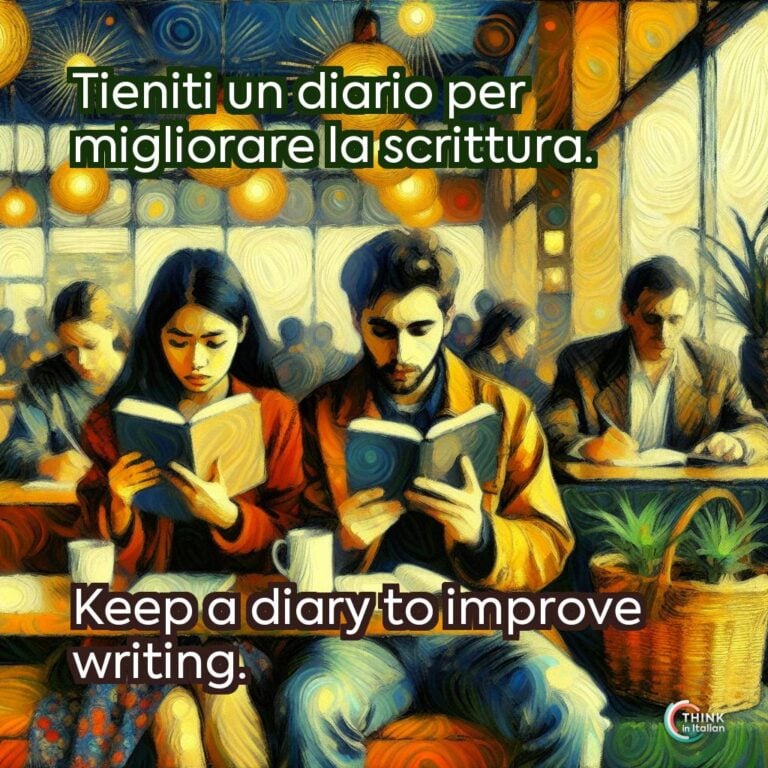When learning a foreign language, there are four main abilities that you must develop: the ability to listen, to speak, to read, and to write.
Writing is a productive skill, which leans on the receptive skills of reading and listening. The best way to write well in Italian is to read authentic materials which are appropriate for your level.
Mastering Italian writing goes far beyond learning grammar and vocabulary; it’s about embracing the nuances, rhythm, and cultural elements that give Italian writing its distinctive character.
By reading Italian books, articles, messages, online posts, and emails, you will learn the natural structure of Italian sentences, idiomatic expressions, and vocabulary that you need.
As a linguist and passionate writer, I love the authenticity and expression of language that help form the soul of effective writing, especially in a language as rich and expressive as Italian.
Writing Styles in Italian
Formal Writing: Precision and Politeness
Formal writing is very important in professional, academic, and official contexts where clarity, structure, and respect are the first concerns. That is why it requires firmness in the use of language and a tone that is courteous and professional.
Whether writing a business letter, an application for employment, or an academic essay, formal writing is characterized by adherence to well-established conventions.
The distinctive features of formal writing in Italian are formulaic openings and closings. Phrases like Egregio Signore (Dear Sir) or Gentile Dottoressa (Dear Doctor) to set the proper tone, and closings like Cordiali saluti (Kind regards) to finish appropriately.
The use of the formal Lei and the use of sophisticated structures underline the politeness and respect that must be conveyed in these contexts.
Conjunctions such as poiché (since) and tuttavia (however) give it subtlety and precision. Attention to such linguistic detail ensures clarity and the professionalism required in such writing.
For instance, in a formal email, it would be:
Egregio Signor Rossi,
La contatto in merito alla sua richiesta di informazioni. Sarebbe possibile fissare un incontro?
Cordiali saluti,
Maria Bianchi
Dear Mr. Rossi,
I am contacting you regarding your request for information. Would it be possible to arrange a meeting?
Kind regards,
Maria Bianchi
Such an email is a perfect example of how respect, clarity, and structure walk hand in hand in effective formal communication in Italian.
Informal Writing: Warmth and Familiarity
Informal Italian writing is the variety that is conversational, relaxed, and richly expressive, normally used while writing to friends, family, or peers, and lives on colloquialisms, slang, and abbreviations.
Greetings are casual and friendly, like a simple ciao, and grammar is usually simpler, with short sentences and contractions preferred.
For example, let me show you a quick text to a friend:
Ciao Sara, come stai? Ieri ho visto quel film di cui parlavamo… bellissimo! Ti va di uscire stasera?
Hi Sara, how are you? Yesterday I saw that movie we talked about… amazing! Want to go out tonight?
This message captures the relaxed, vibrant spirit of informal Italian writing, blending simplicity with heartfelt expression.
Creative Writing: Expressive and Imaginative
Creative writing in Italian is a tapestry of imagery, rhythm, and metaphors that flourish in poetry, short stories, and novels, leading readers to richly imagined worlds.
Poetic devices like similes and metaphors add depth and resonance, comparing fleeting moments to universal truths: come un fiore che sboccia (like a flower blooming) or un cuore di pietra (a heart of stone).
In the light of creative prose, even the most mundane scenes become profound.
Persuasive Writing: Convincing and Engaging
Persuasive writing seeks to captivate and influence the reader’s opinion, often finding its place in advertisements, speeches, and opinion pieces.
It thrives on creating a connection with the audience, whether through the informal warmth of tu or voi, or the respectful distance of Lei in formal contexts.
The choice of words is well studied: its power lies in its vivid language, employing strong verbs like cambiare (to change) or compelling adjectives like incredibile (incredible) to stir emotions and inspire action.
Rhetorical questions, like Hai mai sognato…? (Have you ever dreamed…?), invite readers to engage personally, sparking curiosity and drawing them into the narrative.
Imagine the allure of an advertisement that says:
Hai mai sognato di viaggiare per il mondo senza pensieri? Con la nostra agenzia, il sogno diventa realtà!
Have you ever dreamed of traveling the world without worries? With our agency, the dream becomes reality!
Journalistic Writing: Concise and Informative
Journalistic writing is the art of clarity and objectivity in presenting information directly. Journalistic writing is, of course, found in newspapers, blogs, and news websites.
It follows the inverted pyramid form of writing in which the most important information is always given first. This in turn ensures that the readers catch the main idea in the first instance, while subsequent details add depth and context.
It has to be objective, meaning it does not allow the author’s opinion. For example:
Il governo ha approvato una nuova legge fiscale che entrerà in vigore il prossimo mese. La misura mira a ridurre le tasse per le piccole imprese.
The government has approved a new tax law that will take effect next month. The measure aims to reduce taxes for small businesses.
Write Like a Native
Writing in Italian requires practice, patience, and plunging into authentic material. By understanding different styles, you will be better connected to the culture of Italy, besides improving your way of self-expression.
Be it writing an essay, a personal note, or a poem, embracing the nuances of Italian writing will elevate your skills and make your words truly resonate.
Writing is a process, and with every word, you are one step closer to fluency and being intimate with the language. Let me close with some tips to write like a native:
- Read Widely: explore Italian books, blogs, and newspapers to absorb natural phrasing.
- Mimic Native Writers: emulate the style of Italian authors.
- Write Daily: as always, consistency is the key. Keep a diary, prepare short paragraphs, or put down your thoughts in Italian. Even the simple and imperfect attempts are of great value to build up confidence.
- Seek Feedback: share your writing with native speakers using platforms like Italki or HelloTalk.
- Use Tools: apps like Grammarly (set to Italian) and LanguageTool can refine your grammar and style.






